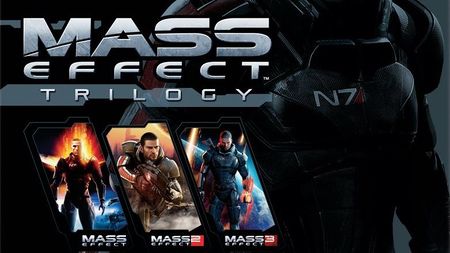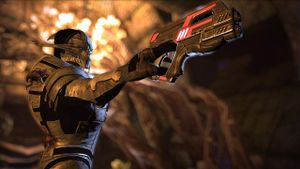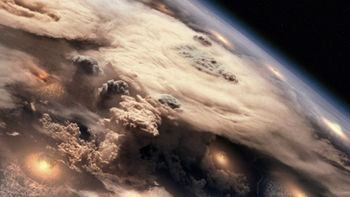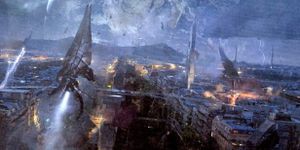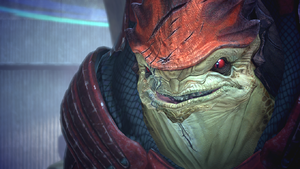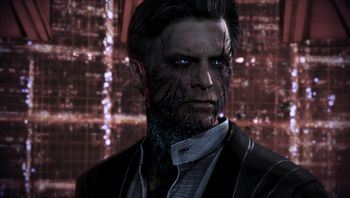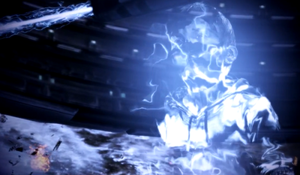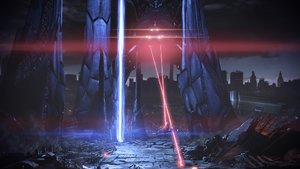Mass Effect 3
Mass Effect 3 is an epic action-adventure RPG released by BioWare and published by BioWare's owner, Electronic Arts. It's the conclusion to the highly acclaimed space opera trilogy also called Mass Effect, and is widely known for its heavy use of Christian allegory in order to address major themes, such as the consequences of battling possible extinction, the battle between the generous and ruthless faces of the human soul, and the destiny of the human race, as well as all fictional non-human species constructed with the human being as a template.
Upon release, the game was predictably highly-acclaimed by critics. However, the conclusion of the trilogy received a very mixed response from most fans of the games, with many being highly critical of it. The furor over the endings caused BioWare to release a free DLC called the "Extended Cut", which elaborated on the possible endings of the game without really changing the plot.[1]
Setting[edit | edit source]
Commander Shepard is a member of the Systems Alliance, which is an organization representing the space-faring civilizations of planet Earth. Upon being dragged into a conspiracy of intergalactic proportions, he/she (you can choose the sex)[2] slowly but surely begins to play a major role in the fate of all life as the fictitious characters of the fictitious universe know it, as their very existence has been jeopardized by the arrival of malevolent sentient beings known as Reapers, who seemingly aim to destroy all life as the fictitious characters of the fictitious universe know it.
A few key terms to remember about the fictitious universe
- Mass Relay: Artifacts that allow space travelers to fuck with the space-time continuum, and hence cross massive distances in seconds. Kind of the reason behind humanity discovering extra-terrestrial life.
- A dialogue wheel thingy: Is how you can control Shepard's response to whatever happens to him. The wheel goes in the direction of caring, to stern, to dick, as the below video's conversations clearly demonstrate. In accordance with the Biblical theme of the faces of the human soul, Shepard can either make Paragon choices, which involve being inclusive, kind and caring towards your fellow space-farers, or Renegade choices, which involve you taking a no-nonsense, I'll-be-a-dick and a by-any-means-necessary approach to intergalactic issues. As is the case in real life, your Paragon and Renegade scores co-exist with one another. You know, 'cause of the whole Fifty shades of grey thing?
- The N-7 Uniform: Can look smoking hot on Shepard, provided you set the sex and character appearance wisely. It's kind of the whole point, really.
Plot[edit | edit source]
Then[edit | edit source]
Mass Effect 1[edit | edit source]
Commander Shepard was a veteran soldier, on an atypical expedition to examine some ancient shit. Then the expedition was attacked, and people died, and he had a vision! A vision of destruction, of annihilation, of horror! The Prothean race which had made all that ancient shit had been murdered! And he wondered by whom.
He watched the treacherous alien responsible for the attack gloat. And he would've gotten away with it too, if Shepard hadn't meddled. But because Shepard meddled, the treacherous alien went underground, and Shepard got promoted to the Spectre Corps, an elite special ops kind of team that's answerable only to the all-powerful Council. With the new tools at his disposal, Shepard uncovered details of a sinister conspiracy that the treacherous alien and his lackeys were engineering. They were going to bring the Reapers back.
As the Reapers were clearly up to no good, Shepard did everything he could to stop this malevolent plot. Ultimately, he came to face the evil alien's evil Jefferson Starship, which was actually a Reaper the whole time! The plot was vanquished, but not without cost. The Council ended up at Shepard's mercy. As for what happened next, why don't you just play the damn game for that? You have to decide!
Mass Effect 2[edit | edit source]
But the ordeal didn't end just there. A few years later, whilst doing his duty as protector of the galaxy, Shepard and his team were attacked by unknown assailants. Pushing his Starship pilot Jeff "Joker" Moreu into an escape pod, Shepard realized that he probably should have checked his space-suit for any ruptures, as the suit DID have ruptures which caused him to suffocate and die.
However, he was recovered by a human supremacist organization of questionable repute known as Cerberus, which brought him back to life. The Illusive Leader of Cerberus hired Shepard to deal with an alien army of Collectors, who were in cohorts with the Reapers to...well, Reap and Collect stuff. But the Collectors were wily enough to take the battle to them, attacking their precious crew members and taking off with some captives. It was then up to Shepard and the survivors to take the fight to the Collectors' home ground beyond the Omega-4 Mass Relay, a haunted space frontier from which none had ever returned!
Depending on your performance in the game, the idiocy quotient of the final mission is determined. Succeeding in winning the loyalty of fellow space-farers by doing jobs for them and working hard to upgrade Shepard's Starship reduces the idiocy quotient, while skipping out on the above activities increases it. Provided you get through the gameplay, the fate of Shepard and his team (i.e, who lives, who dies, etc etc...) will be determined by this idiocy quotient. If it's really low, the entire team survives. If it's high enough, though, everybody-including Shepard-dies, except for Starship pilot "Joker", who is the only guy who lives to tell the tale.[3] And before all that, you also need to deal with that Illusive Leader's suggestion that instead of destroying the Collector base, it be preserved instead for future use. But that just determines whether or not he gets pissed off in the end.
Now[edit | edit source]
Assuming the idiocy quotient wasn't high enough, Shepard survives the battle with the Collectors, only to get into hot water again thanks to a rescue mission he pulled off wherein he had to blow up a Mass Relay to stop a Reaper army. Unfortunately though, the explosion swallowed up 300,000 extras as collateral damage.
Back on Earth, he's put on trial for this brutal and heartless crime when Reapers literally swoop down out of the blue and begin a dazzling lights-and-explosions show. However, nobody is in a mood to enjoy it as their friends and family are dying, and Shepard and the gang escape the burning city of future Vancouver with the help of their trusted Starship, the Normandy. Shepard's arresting officer Admiral Hackett is forced to take charge of Earth's defenses while the Normandy goes into an intergalactic search for solving the root problem.
Fortunately, the search doesn't take them too far. In fact, an old friend named Liara T'Soni has already discovered some ancient Prothean superweapon blueprint on Mars, which, though sadly unfinished, could be powerful enough to annihilate the Reaper invasion, if finished. Unfortunately, though, they're attacked by Cerberus on upon arrival, as their Illusive Leader has been indoctrinated by the Reapers, and is now busy fooling himself into believing he can indoctrinate them using the superweapon.
Upon escape, the gang goes to the Council, begging for much needed assistance in the form of....oh, I don't know...weapons and people and military assistance and stuff. But the Council has issues to deal with. And I mean, delicate, serious, and possibly capable of destroying all life by themselves issues.
For instance, the powerful but resentful Krogans are refusing aid because of the Genophage, a bio-weapon that causes 99.9% of their births to become still-births. And that sounds like a very reasonable stand, until Shepard remembers that the Genophage was made in response to the Krogans plotting universal domination a few centuries back. Depending on your judgement, Shepard can either find a cure for the Genophage, or try and trick the Krogans into believing that he did, followed by possibly murdering one of the Krogan leaders who came on to you.
After ensuring the loyalty of the Krogans, Shepard has to deal with the war between the synthetic Geth and their organic forefathers, the Quarian. Brutally oppressed ever since they became self-aware, the Geth had turned towards the Reapers for assistance in helping them survive. The Reapers did help them survive, in exchange for the Geth's self-awareness, which effectively made them slaves again.[4] With the help of former Quarian crew-member Tali-al-Zorah-something, Shepard uncovers a Reaper conspiracy to upgrade the Geth, making them powerful enough to turn the tables on the war, annihilate the Quarian, and therefore cross off another species from the Reapers' to-do list.
In order to prevent this from happening, Shepard and Tali mount an offensive, forcing the Geth to retreat towards a Reaper base housing their self-awareness. On the way, they're assisted by Legion, a friendly Geth who helped Shepard in Mass Effect 2, and who'd managed to retain his self-awareness when the whole Reaper deal was going down. Eventually, the Geth defenses are overcome, and the Reaper base is destroyed, granting the Geth their free will back again. It is then that the gang learn that the planned Geth upgrades are still viable, the surviving Geth really, really want them, and the Quarian really, really want to blow the surviving Geth to bits. Knowing that the Geth upgrades will doom her people, Tali-al-Zorah-something is fiercely opposed to this idea, while Legion, knowing that not using the upgrades will doom his people, is fiercely supportive of it. Shepard can then do one of three things.
- Upgrade the Geth: If done, the Geth turn the tables on the Quarian, Tali kills herself, and another species is struck off the Reapers' to-do list.
- Shut down the Geth: Pretty self-explanatory. The entire Geth race becomes extinct, including dear Legion, who will lose his shit and try to kill you before getting killed by Tali. Boo-hoo.[5]
- Broker a peace: If you really, really try hard to be the good guy, Shepard might just find a resolution to the conflict. Or maybe it's just enforcing an uneasy truce. Either way, it's a Win/Win. Yay!
In the midst of this problem-solving, Shepard also has to deal with a Cerberus assault, courtesy their indoctrinated Illusive Leader and his trusty assassin Kai Leng, on the Citadel. After saving the life/failing to save the life of a Salarian councilor from the venerable Leng, Shepard learns that old friend Councillor Udina is the mole behind the attack. As he felt that the Council didn't care about planet Earth or, more specifically, the human race, Udina had chosen to enlist Cerebrus' help to overthrow the Council and get emergency powers that he thought would have helped him save Earth's ass. Unfortunately, as Shepard knows, the Illusive Leader of Cerberus has lost his shit, and Udina is now a threat. Therefore Shepard or one of his squadmates kills Udina and saves the Council's ass.
The gang then goes to Thessia, the homeland of the all-female Asari race, in order to defend it from the Reapers and gather information on "The Catalyst", a missing component of the Prothean superweapon which is essential to make it operational. At a Temple there Shepard encounters a Prothean devotee named Vendetta, who just happens to have crucial information on The Catalyst. However, Kai Leng also just happens to be at the Temple, and ends up blowing it up and kidnapping Vendetta.
Shepard and the gang now break into the Cerebrus headquarters, causing a lot of mayhem all around, and fighting and killing Kai Leng and rescuing Vendetta, though the Illusive Leader gets away. Vendetta reveals that The Catalyst actually happens to be the Citadel, without which the superweapon is effectively worthless. He also reveals that the indoctrinated Illusive Guy might have shared this information with the Reapers, and they might have moved the Citadel to a defensive position in the Earth's orbit as result.
An infuriated Shepard meets up with Admiral Hackett, who then decides to launch an assault on planet Earth in order to kick Reaper ass and get a strike team to London, which is the city that connects Earth with the Citadel. As Shepard is part of the strike team, per Captain Obvious's testimony, he and his chosen team mount an assault on London, battling evil Reaper slaves and the notorious Reaper, Mr Harbinger himself! Shepard mounts a charge towards the beam that will transport the team to the Citadel, only to watch his comrades get decimated as he makes his way. After being hit by a Reaper beam himself, an injured Shepard musters up all his strength to stagger through the last mile into the conduit beam.
After being beamed into the Citadel, Shepard wakes up in a room where human remains are...well..scattered about. Suspecting that there may be some sort of processing ring being run by the Reapers, Shepard makes his way across the room, all the while making small talk with fellow comrade Anderson, who'd also somehow made it. He finds Anderson in a control room, but Anderson seems to be kind of possessed. Shepard feels something trying to possess him as well, and realizes that the possessed Illusive Man is the one trying to do all the possessing.
The Illusive Man chides Shepard and Anderson for not taking his suggestion to indoctrinate the Reapers seriously, and claims that he has the power to use the Reapers for good. Both Shepard and Anderson are, per Captain Obvious's testimony, very mistrustful of the Illusive Man, as he happens to be possessed and everything. To demonstrate his awesome power, the Illusive Man makes Shepard shoot Anderson, claiming that the Reapers should be harnessed for their infinite potential. He then tries to breed enmity between them, claiming that Anderson looks at life from the barrel of the gun, that he can never change his ways. An exasperated Shepard can then either piss off the Illusive Man and overpower him, or convince the Illusive Man that he is indeed possessed, because of which he'll kill himself.
Shepard then goes and activates the Catalyst, and he and Anderson discuss, among other things, which way of destroying the Reapers would be the most awesome. They're just getting down to the merits and demerits of some sort of lava rain coming down on them when Anderson breathes his last. Shepard is then informed by Admiral Hackett that the Crucible's not firing, but as he's too dense to do anything about it, he just loses consciousness.
He wakes up on the surface of the Citadel, where he can see the dazzling, explosive war all around him. A holographic child approaches him. Shepard asks where he is, and the holographic child informs him he's still in the Citadel, which happens to be the holograph's home. When Shepard tells him that he wants to stop the Reapers, the holograph reveals itself to be the Catalyst, and their God, and says that He had created the Reapers in order to stop Chaos. When asked what Chaos means, the Catalyst asks Shepard if he's ever viewed The Matrix trilogy or The Terminator film series. When Shepard says he has no idea what the Catalyst is talking about, it reveals that the created always rebel against their creators. Shepard then realizes the Catalyst is talking about the raging wars between the organic and synthetic beings, and how in every case, the organics always regretted creating those stupid self-aware synthetic beings. The relentless mayhem had cost countless lives, and many civilizations would have become extinct if the Reapers hadn't attacked and united the galaxy. The Catalyst implicitly reveals that due to the natural needs of survival and propagation, the synthetics would compete with their organic forefathers for resources, which would naturally breed enmity between them. This enmity could easily escalate into full-blown conflicts in which everyone kills everyone else.
Shepard feels aghast to learn that the only solution to this would be to wipe out all organic life, but The Catalyst clarifies that the Reapers only "harvest" advanced civilizations, leaving younger species like, say, chickens alone. These advanced civilizations are then processed and preserved as Reapers themselves.
Accusing The Catalyst of running a thinly-disguised slavery racket, Shepard exhorts it to allow the organics to keep their future, so that they can always hope for a new tomorrow. The Catalyst informs Shepard that since he's the first organic to have come face-to-face with it, there may be more hope than he can imagine. For instance, it marks an end to the feasibility of the Reaper cycle, and with an organic's help, the superweapon can execute a number of alternative solutions to the problem. Shepard then literally finds himself at a Trident in the road.
The solutions available and their impact on the galaxy is a function of your performance in the game, which is measured by your Effective Military Strength. A higher EMS means more options which offer a better resolution to the war, while a lower EMS means fewer options which will probably result in a post-apocalyptic world. The full range of options possible are-
- Destroy the Reapers and The Catalyst: Shepard can walk over to the right end of the Trident, and fire repeatedly at a weird metal thingy at the end. This causes the metal thingy to blow up, and the Catalyst to shut down. The superweapon will then engage and destroy all Reapers. However, since it doesn't discriminate between Reapers and other synthetic life, all synthetic beings will become extinct. If the EMS is high enough, though, Shepard will be seen gasping for breath amidst a pile of rubble.
- Possess the Reapers: Looks like the Illusive Man was right after all! Shepard can walk up to the left of the Trident, where there's a shiny console with two levers. Shepard can pull at those levers and electrocute himself, causing him to leave his human form and replace the Catalyst as God of all Reapers.
- Synthesize organic and synthetic life together: Shepard can walk down the center of the Trident, where there's a big white beam running down a bottomless pit. If Shepard jumps down the pit, he kills himself, but not before the superweapon absorbs him and amplifies the resultant product to fuse organic and synthetic DNA together. This essentially unites them all the way down to the genetic level, completely changing the dynamics of their civilizations, and ending the conflict at least for the time being.
- Tell the Catalyst to go fuck itself: This was a new ending introduced in the Extended Cut DLC. Shepard can choose to reject all of the Catalyst's suggestions, or shoot the Catalyst when you regain control. As this is tantamount to defying the Reaper God's will, He then says "so be it" in a voice imitating Mr Harbinger's, and allows the cycle to continue. As a result, all advanced civilizations get "harvested", but thankfully Liara T'Soni was wise enough to leave a time capsule for future generations to find. Thanks to this ingenious move, these future civilizations are able to take care of the Reapers successfully.
Concept and Development[edit | edit source]
The Mass Effect series was no stranger to the use of Christian allegory, with the playable protagonist named Commander Shepard, a clear reference to the Biblical Messiah, as well as plot similarities both Mass Effect and Mass Effect 2 shared with the Book of Revelations, the most prominent being the portrayal of the Reapers as antagonists, who are now considered to be a representation of the angels that bring about the end of the world. Various themes discussed in the Bible, such as the destiny of Human, the will of God, and the battle against extinction were also covered in earlier Mass Effect games.
However, in Mass Effect 3, the developers chose to put these themes at the forefront of the story, unlike the previous games, which had largely focused on how Shepard dealt with the space opera equivalents of the Four Horsemen of the Apocalypse, and the evil dragon, and the Bitch of Babylon and stuff. Man in charge Casey Hudson said of the process, "Mass Effect 3 was all about going back to the underlying forces in the background that were driving the earlier games, and bringing them to the forefront. That's how the story develops- the quest starts of as seemingly small, but as the plot thickens, bigger and bigger questions about your mission are raised. The art of subtlety is in knowing when to face those questions head on. To be honest, we had it easy since this happens to be the final fucking game of the series."
Of course, in order to cater to a broader audience, BioWare made many deviations from the original Biblical tales, which included the option of playing as a chick, the absence of actual dragons, and God actually being an AI created by other Super-Gods. "Those who say the Bible shouldn't be taken literally speak the language of sanity." According to an executive producer, "Isn't it enough that it addresses so many interesting questions about the nature of civilization? That's what makes it such a wonderful book, and that's the essence we wanted to capture with this series, creationism and Pat Robertson be damned."
The usual graphical improvements as well as gameplay adjustments were also made, in order to add a more layered feel to the game. "The leveling up system is the best idea BioWare has ever come up with. It's in a class of its own" Casey Hudson has said, though new details about the this "leveling up" were only revealed to those who actually bought and played the game.
The development process ended in February 2012, with the PC, Xbox 360 and PS3 versions of the game released in March 2012. A number of notable actors confirmed that they would reprise their roles for Mass Effect 3, to the surprise and amazement of nobody.
Reception and controversy[edit | edit source]
Predictably, the game was released to widespread critical acclaim, with gaming publications praising practically everything there was to praise about it. "Truly, this is an awesome end to an awesome trilogy!" said one critic, "I mean, the graphics are better, the gameplay is more challenging (unless you play the pansy 'Story Mode') and the best part is that most of the plot won't even make any sense to you unless you've played the preceding two installments! Mass Effect 3 was never about just one game. It was about the entire trilogy. And I'm so glad Bioware realized that! All potential buyers should, therefore, play Mass Effect 1 & 2 before starting on this, and hence make Bioware earn three games' worth of money, instead of one game's!"
Most other reviews were variations on the above, though some were more lavish in their praise, and a surprising number were actually frustrated with Bioware's ploy to make Mass Effect 3 incomprehensible as a standalone title. "That's just wrong, man." said one such critic, "I mean, Mass Effect 1 doesn't even look that good these days, and you wanna force it down the gamers' throats anyway? Oh well, it's practically worth chump change now, so I guess it's no big deal."
Many fans of the series, however, weren't anywhere near as impressed with the game, particularly as a result of its original endings.
The original ending cinematics[edit | edit source]
The game's original endings were notorious for their vague final cinematics, which are now widely seen as an attempt to imitate other "cool" endings like those of Lost or The Sopranos. In the original encounter with The Catalyst, Shepard is told that engaging the superweapon in any way will cause a chain-reaction that destroys the entire Mass-Relay network. Once Shepard makes his choice, the player witnesses a few cool shots of the superweapon in action, followed by a few blink-and-miss cutscenes showing the conclusion of the battle of London, followed by more cool shots of the superweapon in action, followed by a cinematic showing the chain-reaction that destroys the mass-relays. The scene then shifts to the Normandy trying to escape the superweapon's might, which causes it to crash-land on an alien planet. Depending on your EMS and the solution you chose, either nobody's able to leave the Starship, or Joker and maybe one or two of your favorite squad-mates will be able to exit.[6] And as stated before, depending on the EMS Shepard may or may not be shown gasping for breath amidst a pile of rubble if you choose to destroy the Reapers.
And then the credits roll. And then Buzz Aldrin narrates this now age-old legend to a young kid. And then you see a message telling you how awesome DLCs are. And that's it. The End.
Given that choices made throughout the 3 video games were supposed to influence the outcome of the Mass Effect 3, many fans were highly put-off by this conclusion. This resulted in them posting rude comments on gaming websites, accusing the critics of "selling out", as well as flooding Twitter and Facebook timelines with sordid accounts of their "betrayal". The fact that the destruction of even one Mass-Relay could cause the death of over 300,000 extras made many fans worried about the fate of the lives Shepard was trying to save, which as you know, the game didn't really reveal much about. Indeed, with the surviving Normandy crew members, Buzz Aldrin and that kid, and maybe Shepard being the only people explicitly shown alive after the relays are destroyed, the endings were left open to a variety of interpretations. The most common of these was that the destruction of the Mass-Relays had exterminated all life other than the surviving Normandy crew, the aliens on that planet they'd crashed on, and maybe Shepard (who then died of starvation anyway). The crew then repopulated on the alien planet, and Buzz Aldrin and the kid were their descendents.
As this interpretation was horrific and really sucked, a more popular interpretation began doing the rounds. This interpretation suggested that Shepard had actually been indoctrinated by Mr Harbinger the whole time, and all The Catalysts' solutions were actually Harbinger's ploys to get him killed. Which is why the Destroy ending in which Shepard lives has the highest EMS requirement. It's the only ending in which Harbinger fails, and hence the only "good" ending there is.[7]
The fury of the fans resulted in petitions and mass movements to get a "better" ending to the game, and Bioware was even sued by a fan for its "fraudulent PR practices". All sorts of suggestions were given by fans, such as replacing the whole "Catalyst" scene with an epic boss fight that, if won, leads to a happily-ever-after conclusion, or making Shepard a badass who rejects all of The Catalyst's suggestions. But what almost everyone wanted was a more elaborate, clear-cut explanation of how their three-game journey in the Mass Effect universe had mattered in the end.
Bioware's solution: The Extended Cut DLC[edit | edit source]
Bioware officially responded to the controversy through a blog-post by its co-founder, although a former employee had already caused a considerable flutter by whining about how Casey Hudson had secretively scripted the ending and acted like a douchebag to any and all who opposed him.[8] The post effectively stated- "Though we could be total dicks by saying that we don't need to please you petulant, whiny fans and that you should take a lesson in manners from IGN, we have realized that for PR purposes we need to act like average gamers like you really matter. And so, we will give you a better ending, but any more information would spoil it so I'll just shut up now."
In April 2012, a free DLC called "The Extended Cut" was announced, which would largely elaborate on the various possible outcomes in the game and fill in perceived plot-holes, though no radical upheavals to the original endings would take place. Fans were very divided on this announcement, but since they're always divided over announced stuff that hasn't even been released yet, their opinions at this point are unworthy of covering.
On June 26, 2012, the DLC was released worldwide. And true to Bioware's word, it cost nothing more than 1.9GB of your hard disk space.
Changes made in the DLC[edit | edit source]
The DLC largely elaborates on the original endings of Mass Effect 3, and attempts to resolve its plot holes. The reference to the destruction of the Mass-Relays is removed, and the final cutscenes show that they're only heavily-damaged.[9] You can understand the possible solutions better by asking the Catalyst the right questions; and the fate of your squad-mates during the final mission, which varies with your EMS, is shown explicitly this time. In fact, you can even say goodbye to your optional loved one![10]
Joker is actually seen disengaging the Normandy from the superweapon and firing into Faster Than Light mode before the Mass Relay network is hit, and the cutscenes showing the conclusion of the battle are no longer blink-and-miss, nor are they restricted to London. The fate of the lives Shepard tried to save are shown to vary depending on the choices you made and your EMS. The DLC even goes a little easier on the fate of the Normandy crew after it crash-lands. Only one possible ending has them all dead, whereas in all the other ones, Joker and two of your favorite squad-mates exit the spaceship alive.
Depending on the solution chosen (and, of course, your EMS), different concluding cinematics are shown after the landing scene. Admiral Hackett narrates the Destroy endings, God Shepard narrates the Control endings, and a friendly synthetic named EDI narrates the Synthesis ending. The cinematics show the fates of people you may have known and interacted with throughout the trilogy, and the narrators predict what the future holds for everybody. If the Normandy crew survived the crash-landing, they're shown holding a memorial for Shepard and other deceased protagonists, after which, depending on the almighty EMS, you'll either see their ship being repaired, or see them launch back into space. Only after all this do the credits roll, following which Buzz Aldrin narrates the now age-old legend to a young kid, followed by which the developers post a congratulatory message! The End.
As mentioned above, there is also a new ending introduced in which Shepard can tell the Catalyst to go fuck itself. This ending has the shortest closing cinematic, as the Crucible doesn't fire and all the "targets" get "harvested". The post-credits scene in this ending replaces Buzz Aldrin with a Liara T'Soni lookalike, probably as a tribute to the ingenious alien who saved the future kid and said lookalike from Reaper doom. However, since the Catalyst briefly imitates Mr Harbinger during this ending, many die-hard fans of the indoctrination theory, as well as disgruntled gamers who still don't like the endings, have held on to it as "proof" that Shepard was indoctrinated after all. Pitiful whiners.
Footnotes[edit | edit source]
- ↑ Unless you count that new ending they introduced in order to show gamers the consequences of defying God's will.
- ↑ And from now on, we'll call Shepard a he. Because it's convenient, not because we're being sexist or anything.
- ↑ At this point, you may wanna stop reading 'cause Mass Effect 3 never happens if Shepard died in your game.
- ↑ Wait, isn't self-awareness the very reason the Geth went to war with the Quarians to begin with?
- ↑ And yeah, I think that's another species now struck off the Reapers' to-do list.
- ↑ Even though Joker simply disappears during the final mission, and your final squad team seemingly dies during that time.
- ↑ As for the Buzz Aldrin scene, that's just a hallucination some survivor has during the institutionalized remainder of his/her life.
- ↑ This whining was subsequently huffed.
- ↑ Okay, "only" may not have been appropriate there.
- ↑ So what if Mr Harbinger will now momentarily forget about the existence of the Normandy, when it swoops in to take your comrades away, and hovers around long enough for you to gaze into your paramour's beautiful eyes?
